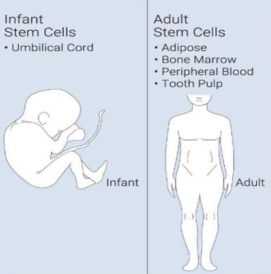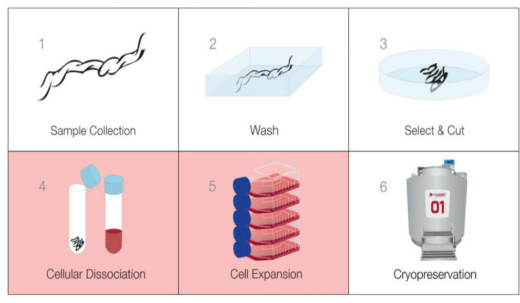What are stem cells?
Stem cells have the ability to divide and create more cells—both new stem cells and differentiated cells—indefinitely. This means they can change into many types of cells, such as muscle, liver and brain cells. Thus they play an important role in natural replacement of aged or apoptotic cells as well as regeneration of damaged tissues.
Stem cell treatment has been helped along by considerable advances in recent years. In 2017, the number of scientific publications about stem cells surpassed 300,000. The number of stem cell clinical trials has also surpassed 4,600 worldwide.
| The potential of Stem Cells has been known to improve medical conditions such as: | ||
|
There are 2 main types of Stem Cells thats are considered to be the most promising adult stem cell types for developing cell- or gene-based therapies: Hematopoietic and Mesenchymal stem cell.
Hematopoietic Stem Cells (HSCs) can develop into all types of blood cells, like white blood cells, red blood cells, and platelets. They are found in the peripheral blood and the bone marrow and are called blood stem cell.
Mesenchymal stem cells (MSCs) are adult stem cells traditionally found in the bone marrow and fat cells. However, mesenchymal stem cells can also be isolated from other tissues including cord blood, peripheral blood, fallopian tube, and fetal liver and lung. Multipotent stem cells, MSCs differentiate to form adipocytes, cartilage, bone, tendons, muscle, and skin.

Sources of Mesenchymal Stem Cells MSC
Mesenchymal stem cells (MSCs) can either be autologous or allogeneic. Autologous means the cells are extracted from your own body, and allogeneic means the cells are from a donor of the same species (human).
The MSCs that WE USE are allogeneic human umbilical cord stem cells derived from the Wharton’s Jelly of the cord. It is the youngest type of MSCs that can be obtained from a human body and therefore it is believed to be the best source for treatment because of its purity.

Collection, Processing & Storage
Prior to storage, the MSC have to undergo a series of quality checks: donors are checked up to 3 generations for genetic flaws and disease.
Our source of stem cells is from Crycord. Established in 2002, CryoCord is one of the largest and most comprehensive private stem cell facility in Southeast Asia, specialising in long-term human stem cell, tissue cryopreservation and research. It is a fully licensed stem cell bank under the Private Healthcare Facilities and Services (PHFS) Act 1998 by the Ministry of Health Malaysia. The laboratory is certified to Current Good Manufacturing Practice (cGMP) in accordance to PIC/S standards by the National Pharmaceutical Regulatory Agency (NPRA), a division of the Ministry of Health Malaysia.
The laboratory houses 8 Class 100 cleanrooms with HEPA filters certified by NEBB USA to prevent cross contamination. Also, they use the SCADA system for strict environmental control.
Most stem cell therapies using approved and accredited mesenchymal HUMAN stem cells are considered safe because the stem cells are collected from a well documented donor and will undergo series of extensive genetic and disease testing, minimizing the risk of an unwanted reaction. The most common side effects are temporary swelling and pain at the location of the infusion.
While most stem cell therapy is considered safe, it does carry the same risks as any other medical procedure, such as a small risk of infection. Risk may be increased if:
- Stem cell source is unverified and not certified by a government body. These stem cells may not be of human origin. That is why we provide certificate of authenticity of source for every infusion.
- Stem cells were not processed in the correct manner. The stem cells may be contaminated.
- Person administering the therapy is not qualified and cannot assess the patient’s needs and risks. Therefore it is crucial to engage the correct qualified medical practitioner.
Unsanitary treatment facility: where you get your treatment is important as to prevent any bacterial infections and immediate supervision in any event.
TO BE SAFE ALWAYS CHOOSE:
- SAFEST & TRUSTED SOURCE OF STEM CELLS
- QUALIFIED MEDICAL PRACTITIONER
- TREATMENTS IN GOOD MEDICAL FACILITIES
Risk of rejection is very minimal with HUMAN mesenchymal stem cells (MSC) because MSC are discovered to be hypoimmunogenic.* This means that these MSC have a resistance to the normal immune response and as such do not pose much of a risk for hypersensitivity reactions. Many case studies have suggested that transplantation of MSC could be beneficial in patients with various disorders requiring tissue regeneration, and provide evidence supporting the tolerance of allogeneic MSC by recipients. Mesenchymal stem cells are a highly regulated self-renewing population of cells with potent mechanisms to avoid allogeneic rejection.
*ReferenceJennifer M Ryan et al, Mesenchymal stem cells avoid allogeneic rejection J Inflamm (Lond)v.2; 2005PMC1215510
A majority of the cost of the treatment goes into the proper stem cell sourcing, processing, or delivery technologies.
Stem cell treatments involve multiple steps, including: diagnosis, preparation of body for stem cell treatment, administering the cells, post-treatment monitoring and follow-up. All these procedures incur a cost that ensure you are provided with the best quality of treatment.
Furthermore, there are also costs for the qualified medical practitioner who provides stem cell treatments. They have overhead costs, including: quality medical facility, training acquired, support personnel, admin requirements.There is also time and expertise required to perform the procedure and offer post-operative care.
By a rule of thumb, the dosage and frequency of the stem cell infusions are determined by your physical condition (your age, weight and condition of health). If you are older, you may require a higher dosage to slow down the degenerative processes. If you are ill, you may also need a higher dose and more frequent infusions to repair damaged organs (every 6 months to a year). If you are healthy, you may only need a moderate dose and at longer intervals (maybe once in 2-3 years).
It is best to seek the advise of the specialist to determine the best treatment plan for yourself.
 If you are healthy, you should consider stem cell treatment as an investment to your future self. Stem cell treatment can be a form of preventive care, repairing any form of damaged or aging cells, and in so doing, slowing down the ageing process. You will feel more energetic and maintain good health. Many have reported to have a healthier glow on their skin and hair. Stem cell treatments are a promising way to achieve a longer life and look younger.
If you are healthy, you should consider stem cell treatment as an investment to your future self. Stem cell treatment can be a form of preventive care, repairing any form of damaged or aging cells, and in so doing, slowing down the ageing process. You will feel more energetic and maintain good health. Many have reported to have a healthier glow on their skin and hair. Stem cell treatments are a promising way to achieve a longer life and look younger.
The Islamic Fiqh Council of the Muslim World League, in its seventeenth conference in Makkah al-Mukarramah, 2003 CE, discussed the topic of transplanting stem cells on the basis of the sources of these cells. The Council took the following decision: it is permissible to obtain stem cells and grow them, and use them for medical treatment or permissible scientific research, if the sources are permissible. That includes, for example, the following sources:
- Adults if they have given permission and that will not cause any harm.
- Children, if their guardians have given permission, if it is done for a legitimate purpose and without harm
- Placentas and umbilical cords, with the permission of the parents.
- Spontaneously aborted foetuses (i.e., miscarriage) or foetuses from abortions that were carried out for medical reasons permitted by sharee‘ah, with the permission of the parents.
*Referencehttps://islamqa.info/en/answers/108125/stem-cells-definition-ruling-on-setting-up-stem-cell-banks-and-using-them-for-medical-purposes Publication : 26-06-2011
 There are many facilities that offer stem cell treatments that are animal based such as sheep placenta or plant stem cells. We highly advise against these stem cells because they are not suitable for the body. Our bodies’ immune system will reject cells that are not of the same species. Therefore there is a high chance that you may develop a severe allergic reaction if you receive these treatments.
There are many facilities that offer stem cell treatments that are animal based such as sheep placenta or plant stem cells. We highly advise against these stem cells because they are not suitable for the body. Our bodies’ immune system will reject cells that are not of the same species. Therefore there is a high chance that you may develop a severe allergic reaction if you receive these treatments.
Here at Cell Quest, under the design of Dr. Kent Woo, a leading immunologist in South East Asia, we have developed a international standard protocol that is superior to all other treatments in the market to day. We follow a 4-step protocol that allow us to mold the treatment to match the client’s needs and body’s requirement.
Through the 1st step, we diagnose and consult the client regarding the needs to improve their physical state. Then in the 2nd step (pre-conditioning) we prepare the body so that it is in its best state to receive the stem cell infusion. Imagine your body as a piece of land, and the act of pre-conditioning is like adding fertiliser to receive the seed (the stem cells). Only then we provide the stem cell infusion. The post conditioning is a combination of supplements and enhancers to ensure the best efficacy of the stem treatment so that the good benefits last longer.
For more info, please visit Stem Cell Infusion.
